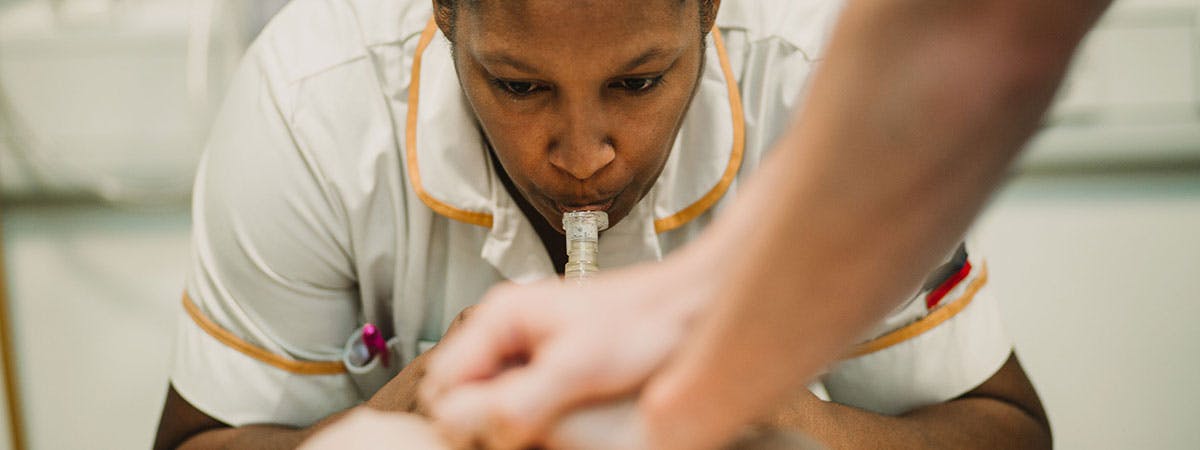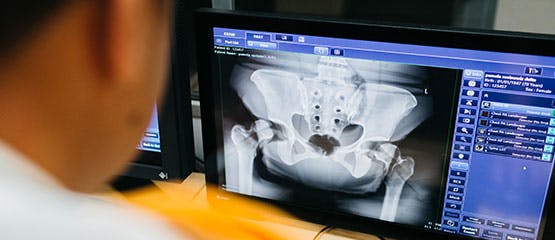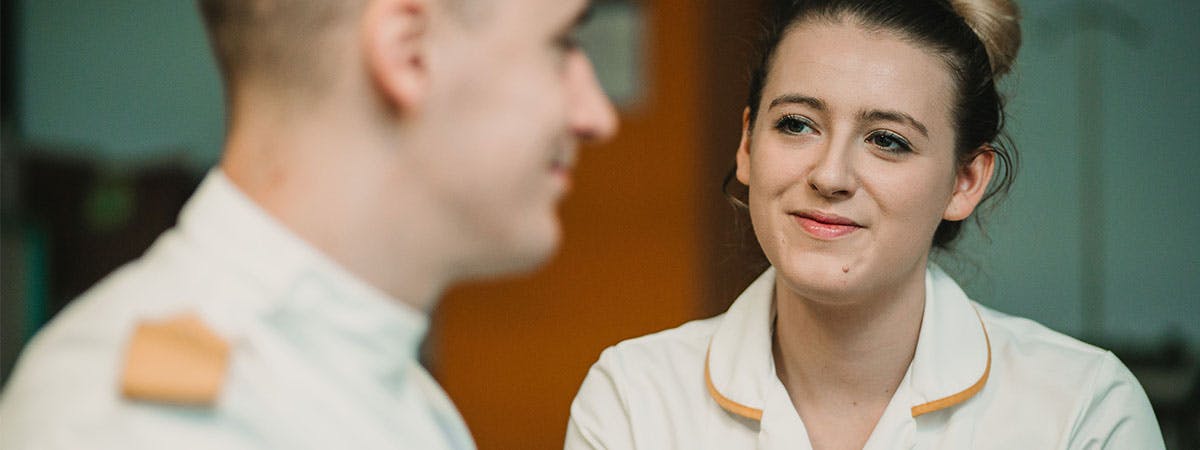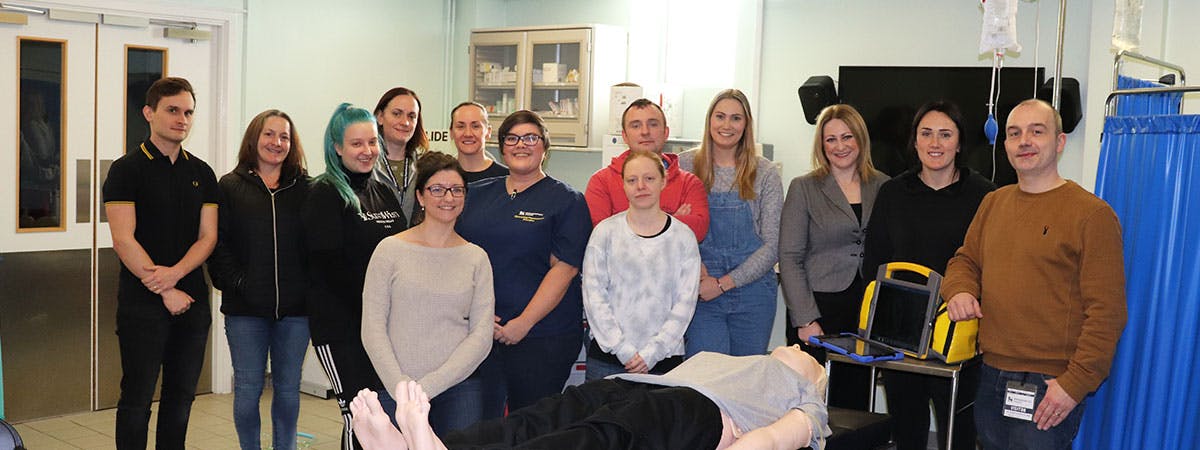At Birmingham City University, we are proud to work closely with the Armed Forces. Our Defence School of Healthcare Education offers BSc (Hons) Nursing (in either Adult or Mental Health) and BSc (Hons) Diagnostic Radiography for military personnel.

If you are interested in joining the military, and undertaking one of these healthcare roles, these FAQs may help you decide the right path for you.
What are the entry requirements for studying a healthcare degree/DipHE in the Armed Forces?
The academic entry requirements are set out by Birmingham City University, so are the same as for those undertaking the civilian route. The only exception is if you are applying to the RAF. They will only accept GCSEs in Maths, English and Science. Equivalents such as functional skills will not be taken as alternatives.
How do I apply to study a healthcare degree/DipHE with the military?
If you are not already in the Armed Forces, you’ll need to apply to join the Army, Navy or RAF, as a student nurse, ODP or radiographer. Once you have successfully completed and passed the assessment process, you’ll then continue on to apply for the degree, and the staff within the Defence School of Healthcare Education at Birmingham City University will help you with that. You won’t need to complete your application via UCAS, but you will need to meet the specific entry requirements for the course.
How do I make my application stand out?
It’s important to convey why you want to be a nurse, ODP or radiographer, and what qualities you feel you have that fit the role well. Think about what experiences you have in terms of working or volunteering in healthcare, and any examples of teamwork and communication skills you have. As with any job application, you need to show your passion and commitment to both the role itself and the military service you want to be part of.
What is the application process to join the Armed Forces?
The process is very similar for each service. Here is a basic summary of the stages involved, although please check the individual websites for more information:
- Register your interest online: Recruitment only takes place at certain times of the year, and it will depend on the needs of the services, as to what roles are available.
- Complete your initial application online.
- Complete a range of assessments: This includes medical and fitness tests.
- Attend an interview: This is likely to include a 10 minute presentation, and you will be provided with additional information about what this should cover.
- Basic training: Once you have successfully completed all of the stages above, you will then need to complete 10-14 weeks of basic military training. This will prepare you for life in the military, and you must successfully pass this training, before you can begin your studies.
For more detailed information, please visit Army, Royal Navy or RAF websites.
When do I need to apply to gain a place on a degree/DipHE as a military student?
The process can take 12-18 months, so if it is something you are considering, it’s best to apply early. This is due to needing to complete (and pass) several stages before the start of the degree (i.e. application, assessment, medical and fitness tests, interview, and basic training).
Will I need to find my own accommodation?
No – accommodation will be provided for you. Military students are housed together, but they also have accommodation available for families. If you are local to Birmingham, you could opt to stay at your current residence.
Can I do any of these courses on a part-time basis?
If you choose to study as a military student, you can only do this on a full-time basis. If you choose to study as a civilian, it is only our BSc (Hons) Diagnostic Radiography that offers both a full-time (three years) and part-time (six years) option.

Should I join the forces before or after my degree or DipHE?
This all depends on your personal circumstances and what you want to do. If choosing the university to study at is important to you, and you have other things you’d like to explore, then gaining your healthcare qualification first may be best for you.
If you are ready to embrace life in the military, then studying your healthcare degree as a member of the Armed Forces may be a better option for you. Some advantages of taking this route include (but are not limited to):
- No course fees – these are covered by the military.
- Receiving a salary during your course.
- Subsidised food and accommodation.
How many places are available each year?
Each service has its own quota, which varies from year to year, depending on what staff they need. There are usually more nursing places available than ODP or radiography, but even then, places are extremely limited, so competition is high.
Are the courses different for military students, and are military students taught separately?
The courses are the same for military and civilian students, including the teaching and the placements you’ll undertake, which the University organises. Everyone is taught together and there is no distinction between military and civilian students on the course. As a military student, you may have additional sessions that the military require you to complete, both on and off campus. There may also be an additional placement during your course within a military primary care setting.
Will I be required to wear my military uniform on campus?
As part of your course, you won’t be required to wear your military uniform on campus. When you are undertaking clinical learning on campus, such as skills sessions in our mock wards, x-ray suite, operating theatre and skills rooms, you will be required to wear your BCU course-specific student uniform.
Where could I be working on graduation?
On graduation, you will need to complete your preceptorship to ensure you have all the skills, knowledge and competencies needed to deploy as a qualified healthcare professional. Preceptorships are often completed within NHS hospitals in Birmingham, Plymouth and Portsmouth for the Navy and RAF. If you are in the Army, you could be located in Birmingham, Portsmouth, Surrey or Middlesbrough during this time. You will not be deployed until you have completed your preceptorship.
When you are not on deployment, it is likely that you will be working in a NHS hospital, alongside civilian healthcare professionals, although there could be opportunities to undertake non-clinical roles such as recruitment and outreach later in your career.

Could a medical career in the military be for you?
To find out more, visit our Nursing, ODP or Radiography course pages, register for one of our open days, or contact the Army, Navy or RAF directly.





